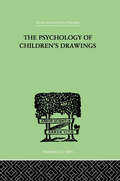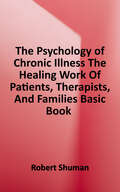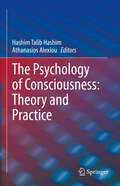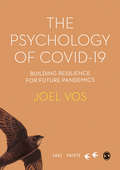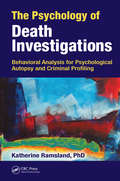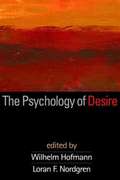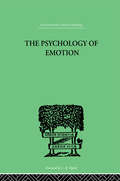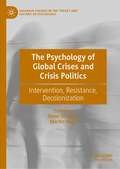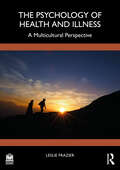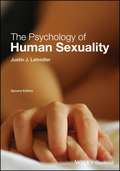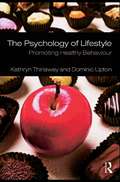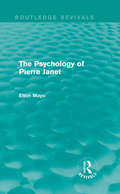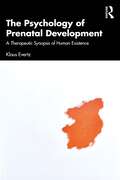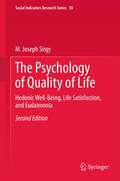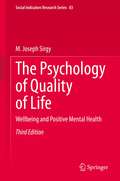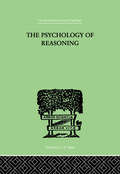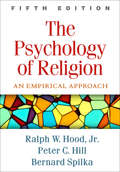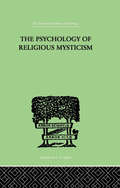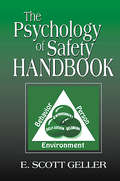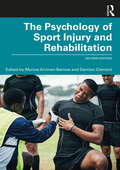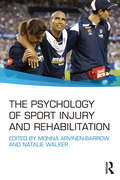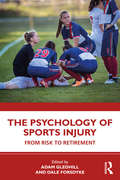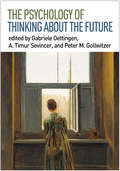- Table View
- List View
The Psychology of Children's Drawings: From the First Stroke to the Coloured Drawing (International Library Of Psychology Ser.)
by Eng, HelgaFirst Published in 1999. Routledge is an imprint of Taylor & Francis, an informa company.
The Psychology of Chronic Illness: The Healing Work of Patients, Therapists, and Families
by Robert ShumanWith the onset of chronic illness, an individual and family’s world, previously taken for granted, is often undone. The actual and potential losses from illness impact family, friends, physicians, therapists, nurses, and others in profound and unexpected ways. Through his own honest, personal account and the testimony of others, Robert Shuman takes us inside the illness experience to help us better grasp the daily inner lives of the ailing person and his or her family. As our aging population lives longer, chronic illness touches more and more of us. Whether as patient or parent, nurse or spouse, colleague or therapist, we need to have greater knowledge and understanding of the intricacies of chronic illness. Robert Shuman maps out the many dimensions of illness and invites the reader to explore its challenging terrain in a way that provides opportunities for self-discovery and reflection. In lyrical prose, he opens up new ways of thinking about the psychology of illness and healing. He suggests, for example, that illness symptoms can have a generative effect on a person’s imaginative and creative possibilities, and that the socially despised events of illness and disability offer new ways of being once sought through the work of religion. Drawing on the fields of behavioral and family medicine, medical anthropology and sociology, moral and bioethical philosophies, and family, existential, cognitive, Jungian, and archetypal psychotherapies, among others, The Psychology of Chronic Illness raises provocative questions for the professional caregiver as well as for those living with illness and disability. This book will help anyone touched by illness, personally or professionally, to support those living with chronic illnesses and disabilities; to cope with multiple impacts on work, relationships, social roles, individual dreams, and disappointments; to listen to and voice suffering and fears, grief and anger, questions of values and moral doubts; and to acknowledge loss and mourning as a “common ground” that we all share. This book offers specific resources to the caregiver and aids the professional in his or her ethical obligation to give. Moreover, Shuman’s voice is one of compassion, reminding us how to hold on to or recover hope, meaning, and morale during times of affliction and distress.
The Psychology of Consciousness: Theory and Practice
by Athanasios Alexiou Hashim Talib HashimThis book talks about the levels of consciousness and their roles in controlling our life and behaviour. The consciousness has a main role in learning human to behave and to live in all life’s situation and ages. This book clarifies these situations in details and the laws that make this system work properly. It provides many solutions and suggestions to control ourselves and our minds and put them in the right way. This book explains many of our behaviours depending on the psychology and the role of the consciousness in the psychiatry, how to treat diseases and mental disorders and how to improve the mental health as well. This subject is not well discussed and detailed in literature so there is a need to give this topic its role in the psychology and in scientific literature too. This book is targeting the consciousness’ levels and the role of these levels in our life and behaviours, so it divides the roles among them as appropriate and in the right way and then the humans can recognize which part is more important than the other and on what they should focus.
The Psychology of Covid-19: Building Resilience for Future Pandemics (SAGE Swifts)
by Joel VosThe Psychology of Covid-19 explores how the coronavirus is giving rise to a new order in our personal lives, societies and politics. Rooted in systematic research on Covid-19 and previous pandemics, including SARS, Ebola, HIV and the Spanish Flu, this book describes how Covid-19 has impacted a broad range of domains, including self-perception, lifestyle, politics, mental health, media, and meaning in life. Building on this, the book then sets out how we can improve our psychological and social resilience, to safeguard ourselves against the psychological effects of future pandemics.
The Psychology of Covid-19: Building Resilience for Future Pandemics (SAGE Swifts)
by Joel VosThe Psychology of Covid-19 explores how the coronavirus is giving rise to a new order in our personal lives, societies and politics. Rooted in systematic research on Covid-19 and previous pandemics, including SARS, Ebola, HIV and the Spanish Flu, this book describes how Covid-19 has impacted a broad range of domains, including self-perception, lifestyle, politics, mental health, media, and meaning in life. Building on this, the book then sets out how we can improve our psychological and social resilience, to safeguard ourselves against the psychological effects of future pandemics.
The Psychology of Death Investigations: Behavioral Analysis for Psychological Autopsy and Criminal Profiling
by Katherine RamslandThe Psychology of Death Investigations outlines definitively how behavioral evidence can often provide the necessary components and "missing pieces" to complement physical evidence as an essential tool for incident reconstruction. In order to determine the direction of an investigation and to prioritize leads, if necessary, death investigators must establish the manner of a death: natural, accident, homicide or suicide. The most overlooked aspect of death investigation is the psychological dimension, which can provide unique leads, correct false assumptions, enhance investigative awareness, and solve cases in surprising ways. In an estimated 10–20% of cases, the manner of death cannot be determined, or worse, has been erroneously categorized. Since many jurisdictions can’t afford behavioral consultants, this book has been written to provide practical information for a basic psychological analysis. If the circumstances surrounding a death are equivocal, psychological consultants can compile information retrospectively about a deceased person’s mental state and possible motive to assist with unravelling ambiguity about the manner of death. This is the primary function of a psychological autopsy, and, as such, this is the first book of its kind dedicated solely to the topic. In the event that the manner of death is determined to be a homicide, behavioral profiling can help to focus the potential pool of suspects. Professionals and students alike will benefit from the exercise of cognitive awareness and the application of psychological logic presented. Psychologists, medical examiners, coroners, attorneys, fraud examiners, law enforcement personnel, death and homicide investigators, and students enrolled in criminal profiling, forensic psychology, and criminal justice programs will find this text to be a compelling and insightful reference to add to their professional toolkit.
The Psychology of Desire
by Loran F. Nordgren Wilhelm HofmannProviding a comprehensive perspective on human desire, this volume brings together leading experts from multiple psychological subdisciplines. It addresses such key questions as how desires of different kinds emerge, how they influence judgment and decision making, and how problematic desires can be effectively controlled. Current research is reviewed on underlying brain mechanisms and regulatory processes. Cutting-edge measurement tools are described, including practical recommendations for their use. The book also examines pathological forms of desire and the complex relationship between desire and happiness. The concluding section analyzes specific applied domains--eating, sex, aggression, substance use, shopping, and social media.
The Psychology of Emotion: Morbid and Normal (International Library Of Psychology)
by MacCurdy, John TThis is Volume XII of nineteen in a collection of Abnormal and Clinical Psychology. Originally published in 1925, this research stemmed from many discussions about the applicability of psychoanalytic principles to manic-depressive insanity, whether the symptoms could be traced to unconscious mental processes in the same way as Jung had demonstrated it to be possible in dementia praecox and ended up with the general objective moving from that of psychopathological to one of psychological conclusions .
The Psychology of Fatigue
by Robert HockeyFatigue can have a major impact on an individual's performance and wellbeing, yet is poorly understood, even within the scientific community. There is no developed theory of its origins or functions, and different types of fatigue (mental, physical, sleepiness) are routinely confused. The widespread interpretation of fatigue as a negative consequence of work may be true only for externally imposed goals; meaningful or self-initiated work is rarely tiring and often invigorating. In the first book dedicated to the systematic treatment of fatigue for over sixty years, Robert Hockey examines its many aspects - social history, neuroscience, energetics, exercise physiology, sleep and clinical implications - and develops a new motivational control theory, in which fatigue is treated as an emotion having a fundamental adaptive role in the management of goals. He then uses this new perspective to explore the role of fatigue in relation to individual motivation, working life and wellbeing.
The Psychology of Global Crises and Crisis Politics: Intervention, Resistance, Decolonization (Palgrave Studies in the Theory and History of Psychology)
by Martin Dege Irene StrasserThis edited volume brings together some of the most prominent scholars in the fields of theoretical, critical, and political psychology to examine crisis phenomena. The book investigates the role of psychology as a science in times of crisis, discusses how socio-political change affects the discipline and profession, and renders psychological interventions as forms of political action.The authors examine how notions of crisis and the interpretation of crisis scenarios are heavily intertwined with governmental and state interests. Seeking to disentangle individual subjectivity, subjectification, and science as forms of politics, the volume works toward an explicit goal to decolonize psychology. The chapters elaborate on the importance of the psychological sciences in times of crisis and the role of psychologists as practitioners. Ultimately, the diverse contributions underline the connection of scientific theory, practice, and politics.Interdisciplinary in scope and wide-ranging in its perspectives, this timely work will appeal to students and scholars of theoretical and political psychology, critical psychology, and cultural studies.
The Psychology of Health and Illness: A Multicultural Perspective
by Leslie D. FrazierThe Psychology of Health and Illness is a thoroughly updated version of Leslie Frazier’s previous textbook on health psychology, which provides an engaging and contemporary approach to understanding health psychology from a truly international perspective. Combining both biopsychosocial and lifespan developmental perspectives, the book integrates core theory, research, and practice on global and cross-cultural health issues. It includes thoughtful and deliberately inclusive coverage of marginalized groups, especially BIPOC, LGBTQ+, and other underrepresented groups, designed to raise diversity and racial consciousness in a globally integrative way.Alongside classic health psychology concepts, the author introduces students to cutting-edge scientific and medical topics such as epigenetics, the gut microbiome, and the nonmedical use of prescription drugs. The book also focuses on global public health and health disparities and promotes a strengths-based approach to health, rather than a deficits-based approach. It includes a wide range of pedagogical features including real-world applications, engaging anecdotes and case studies, opportunities for self-reflection, and numerous text boxes.This is essential reading for undergraduate students on Health Psychology courses as well as those in related fields such as nursing and the allied health professions.
The Psychology of Human Sexuality
by Justin J. Lehmiller<p>The thoroughly revised and updated second edition of The Psychology of Human Sexuality explores the roles that biology, psychology, and the social and cultural context play in shaping human sexual behavior. The author – a noted authority on the topic and an affiliate of the acclaimed Kinsey Institute - puts the spotlight on the most recent research and theory on human sexuality, with an emphasis on psychology. <p>The text presents the major theoretical perspectives on human sexuality, and details the vast diversity of sexual attitudes and behaviors that exist in the modern world. The author also reviews the history of sexology and explores its unique methods and ethical considerations. Overall, this important and comprehensive text provides readers with a better understanding of, and appreciation for, the science of sex and the amazing complexity of human sexuality.</p>
The Psychology of Lifestyle: Promoting Healthy Behaviour
by Dominic Upton Kathryn ThirlawayImproving lifestyles is thought to be one of the most effective means of reducing mortality and morbidity in the developed world. However, despite decades of health promotion, there has been no significant difference to lifestyles and instead there are rising levels of inactivity and obesity. The Psychology of Lifestyle addresses the role psychology can play in reversing the trend of deleterious lifestyle choices. It considers the common characteristics of lifestyle behaviours and reflects on how we can inform and improve interventions to promote healthy lifestyles. Health promotion has taught people what a healthy lifestyle is – now we need to enable people to live that life. The chapters cover key lifestyle behaviours that impact on health –smoking, eating, physical activity, drinking, sex and drug use – as well as combinations of behaviours. Each chapter contains interventions that have been developed to influence and promote lifestyle change among patients and clients. This unique book will enable readers to develop a clear theoretical and practical grasp of the psychological principles involved in all aspects of lifestyle change. It is an invaluable resource for students and professionals committed to health promotion within all health-related disciplines.
The Psychology of Pierre Janet (Routledge Revivals)
by Elton MayoPierre Janet (1859 – 1947) is considered to be one of the founders of psychology, and pioneered research in the disciplines of psychology, philosophy and psychotherapy. Janet’s most crucial research, particularly in the subjects of ‘dissociation’ and ‘subconscious’ - terms coined by him - is explored in this book, first published in 1952. As Janet did not publish much in English, these notes provide guidance on such areas of study as hysteria and hypnosis, obsessive thinking and the psychology of adaption. Elton Mayo’s comprehensive collection is an important guide for any student with an interest in the history of psychology, psychopathology and social study, and Janet’s revolutionary work in the field.
The Psychology of Prenatal Development: A Therapeutic Synopsis of Human Existence
by Klaus EvertzThis important book introduces the basics of prenatal psychology and works through the current scientific findings in the psychology and psychosomatics of pregnancy and birth. Through exploring bio-psycho-social relationships, as well as historical and cultural perspectives, this interdisciplinary approach easily breaks down specialist discussions into easy-to-understand concepts.Bridging the gap between foetal programming and psychological research and practice, this accessible book presents the history of the field and the basic concepts of prenatal development before exploring the behavioural dimensions of life before, during, and immediately after birth. Topics include sensory and emotional development in the womb, perception and brain development, the influence of environmental factors and prenatal imprinting and long-term effects. The author also delves into the concept of attachment and support and analyses body symptoms, sensations, feelings and inner images in dreams and imaginations, through the role of art creations and biographical narratives. As a whole, this book provides a therapeutic synopsis of the entire existence, which begins with conception.Explaining how experiences in the prenatal period influence basic psychological imprints across the lifespan, this book is an essential resource for students in a wide range of interrelated disciplines, including developmental psychology, paediatric medicine, neuroscience, infancy and early child development, nursing, social work and early childhood education. It may also be of interest to researchers, clinicians and related professionals.
The Psychology of Quality of Life
by M. Joseph SirgyThe second edition will be an update and further elaboration of the literature related to subjective well-being, happiness, and life satisfaction. It will have a new substantial section that focuses on reviewing much of the literature of subjective well-being within specific life domains (social life, material life, leisure life, work life, community life, spiritual life, family life, health life, sex life, travel life, etc.) In the 1st edition the research in these various life domains was discussed only briefly. The second edition will maintain the same organizational structure of the first edition; that is, Part 1 will focus on introduction (definitions and distinctions; examples of measures of subjective well-being, happiness, and life satisfaction; and motives underlying subjective well-being). Part 2 will focus on psychological strategies that are allow people to optimize subjective well-being by engaging in psychological processes related to the relationship between and among life domains (e.g., social life, family life, love life, spiritual life, community life, financial life, etc.) This part will contain four chapters related to these various "inter-domain" processes: bottom-up spillover, top-down spillover, horizontal spillover, and compensation. Part 3 of the book will focus on "intra-domain" psychological strategies designed to optimize subjective well-being. These include re-evaluation based on personal history, re-evaluation based on self-concept, re-evaluation based on social comparison, goal selection, goal implementation and attainment, and re-appraisal. Part 4 of the book will focus on balance processes--how people attempt to create balance in their lives using psychological processes within specific life domains (intra-domain strategies) and processes that relate one domain to another (inter-domain strategies).
The Psychology of Quality of Life: Wellbeing and Positive Mental Health (Social Indicators Research Series #83)
by M. Joseph SirgyThe third, thoroughly revised and enhanced edition of this bestselling book analyses and discusses the most up-to-date research on the psychology of quality of life. The book is divided into six parts. The introductory part lays the philosophical and academic foundation of much of the research on wellbeing and positive mental health, showing the beneficial effects of happy people at work, health, and to society at large. Part 2 (effects of objective reality) describes how sociocultural factors, income factors, other demographic factors, and biological and health conditions affect wellbeing and positive mental health. Part 3 focuses on subjective reality and discusses how individuals process information from their objective environment, and how they manipulate this information that affects wellbeing and positive mental health. Part 4 focuses on the psychology of quality of life specific to life domains, while Part 5 reviews the research on special populations: children, women, the elderly, but also the disabled, drug addicts, prostitutes, emergency personnel, immigrants, teachers, and caregivers. The final part of the book focuses on theories and models of wellbeing and positive mental health that integrate and unify disparate concepts and programs of research. The book addresses the importance of the psychology of quality of life in the context of public policy and calls for a broadening of the approach in happiness research to incorporate other aspects of quality of life at the group, community, and societal levels. It is of topical interest to academics, students and researchers of quality of life, well-being research, happiness studies, psychotherapy, and social policy.
The Psychology of Reasoning (International Library Of Psychology Ser.)
by Rignano, EugenioFirst Published in 1999. Routledge is an imprint of Taylor & Francis, an informa company.
The Psychology of Religion, Fifth Edition: An Empirical Approach (Archive For The Psychology Of Religion/ Archiv Fur Religionspsychologie Ser. #Vol. 27)
by Bernard Spilka Ralph W. Hood Jr. Peter C. HillKeeping up with the rapidly growing research base, the leading graduate-level psychology of religion text is now in a fully updated fifth edition. It takes a balanced, empirically driven approach to understanding the role of religion in individual functioning and social behavior. Integrating research on numerous different faith traditions, the book addresses the quest for meaning; links between religion and biology; religious thought, belief, and behavior across the lifespan; experiential dimensions of religion and spirituality; the social psychology of religious organizations; and connections to coping, adjustment, and mental disorder. Chapter-opening quotations and topical research boxes enhance the readability of this highly instructive text. New to This Edition *New topics: cognitive science of religion; religion and violence; and groups that advocate terrorist tactics. *The latest empirical findings, including hundreds of new references. *Expanded discussion of atheism and varieties of nonbelief. *More research on religions outside the Judeo-Christian tradition, particularly Islam. *State-of-the-art research methods, including techniques for assessing neurological states.
The Psychology of Religious Mysticism
by James H. LeubaFirst Published in 1999. Routledge is an imprint of Taylor & Francis, an informa company.
The Psychology of Safety Handbook
by E. Scott GellerYou cannot improve your organization's safety performance to enviable levels without addressing human behavior and attitude effectively. The only comprehensive reference on the psychology of the human dynamics of safety, The Psychology of Safety Handbook shows you how to apply psychology to improve safety and health in your organization. Dr. Geller
The Psychology of Sport Injury and Rehabilitation
by Monna Arvinen-Barrow Damien ClementWritten by internationally known experts The Psychology of Sport Injury and Rehabilitation draws on the latest research in sport psychology and sports medicine. Using case studies to augment the reader’s experience, this new edition emphasizes the importance of a holistic, interprofessional approach to sport injury management and care. By doing so, the book provides injured individuals, their families, and healthcare professionals a thorough overview of how psychology plays a role in sport injury prevention, rehabilitation, and return to participation process. Athletes routinely use psychological skills and interventions for performance enhancement but, perhaps surprisingly, not always to assist in recovery from injury. This book demonstrates the ways in which athletes and practitioners can transfer psychological skills to an injury and rehabilitation setting to enhance recovery and the well-being of the athlete. Psychology of injury is an integral part of sport injury prevention, rehabilitation, and return to participation process. The second edition of The Psychology of Sport Injury and Rehabilitation is a comprehensive text grounded in biopsychosocial theory and scientific evidence. The fully revised second edition is an important resource for students, academic scholars, and applied practitioners working in sport psychology, sports medicine, sports coaching, and other related healthcare professions.
The Psychology of Sport Injury and Rehabilitation
by Monna Arvinen-Barrow Natalie WalkerAthletes routinely use psychological skills and interventions for performance enhancement but, perhaps surprisingly, not always to assist in recovery from injury. This book demonstrates the ways in which athletes and practitioners can transfer psychological skills to an injury and rehabilitation setting, to enhance recovery and the well-being of the athlete. Drawing on the very latest research in sport and exercise psychology, this book explores key psychological concepts relating to injury, explaining typical psychological responses to injury and psychological aspects of rehabilitation. Using case studies in every chapter to highlight the day-to-day reality of working with injured athletes, it introduces a series of practical interventions, skills and techniques, underpinned by an evidence-base, with a full explanation of how each might affect an athlete's recovery from injury. The Psychology of Sport Injury and Rehabilitation emphasises the importance of an holistic, multi-disciplinary approach to sports injury and rehabilitation. No other book examines the psychological aspects of both sports injury and the rehabilitation process, and therefore this is an essential resource for students, scholars and practitioners working in sport psychology, sports therapy, sports medicine or coaching.
The Psychology of Sports Injury: From Risk to Retirement
by Adam Gledhill Dale ForsdykeThe Psychology of Sports Injury: From Risk to Retirement provides a critical overview of the psychology of sports injury, covering the 5Rs of sports injury: risk, response, rehabilitation, return to sport and retirement. Drawing on a range of expert international perspectives from the fields of sport psychology and sport and exercise medicine, The Psychology of Sports Injury covers the psychological considerations associated with sports injuries, prior to the onset of injury through to supporting athletes with post-injury retirement. In addition to this injury lifespan perspective, the book features special interest topics including anterior cruciate ligament injury, sport-related concussion, spinal cord injury and the role of coaches in achieving athlete and team medical outcomes. Additionally, case studies provide the opportunity to apply learning from each chapter. By covering the sports injury journey from risk factors to retirement and including athlete mental health during sports injury, The Psychology of Sports Injury is an essential text for students, instructors, and practitioners in sports psychology, sport and exercise medicine and other related fields.
The Psychology of Thinking about the Future
by Gabriele Oettingen Peter M. Gollwitzer A. Timur SevincerWhy do people spend so much time thinking about the future, imagining scenarios that may never occur, and making (often unrealistic) predictions ? This volume brings together leading researchers from multiple psychological subdisciplines to explore the central role of future-thinking in human behavior across the lifespan. It presents cutting-edge work on the mechanisms involved in visualizing, predicting, and planning for the future. Implications are explored for such important domains as well-being and mental health, academic and job performance, ethical decision making, and financial behavior. Throughout, chapters highlight effective self-regulation strategies that help people pursue and realize their short- and long-term goals.
